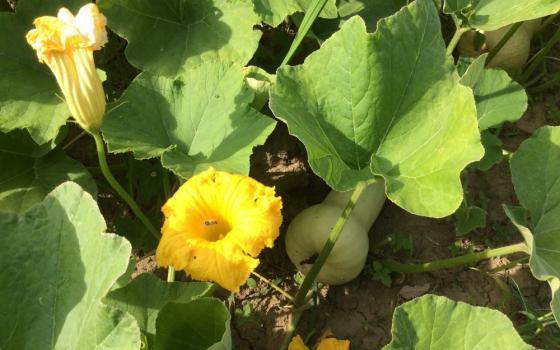When I began taking care of our community's 1.5-acre vegetable garden this season, I imagined it going something like this: I'd arrive to the garden in the cool morning hours to spend blissful days tending healthy plants, reveling in the glory of creation and giving thanks for the miracle of Earth's bounty. Over meals prepared with said bounty, my sisters and I would discuss the importance of good stewardship and ecological conversion.
Not surprisingly, my reality has been somewhat different: I arrive in the cool morning hours, groggy and sometimes sore from the previous day's work to begin yet another day of pulling the weeds that are hell-bent not only on surviving but also on doing it precisely where the leeks are trying to grow. Before I know it, another week has passed in a flurry of weeding and harvesting, and I've hardly taken a moment to enjoy the company of the garden or my co-worker, let alone that of my sisters, who have been infinitely encouraging and grateful for the fresh produce.
Let me be clear: I love this work. I find it life-giving and full of purpose. I enjoy the manual labor and don't mind working long days. However, the clash between my vision (however far-fetched) and my reality forces me to face, not for the first time, an unpleasant truth: I am far too prone to the self-serving workaholism so prized in our culture. Even in an idyllic setting, doing work that connects me with the changing rhythms of the seasons, it is hard for me to prioritize rest and restoration. And it is precisely because the choice is so difficult that I believe it is such an important one, even a radical one. So I've been trying to learn and practice Sabbath.
Stemming from the Genesis narrative in which God rests after the work of creation and specifically blesses a day for humans to do the same, Sabbath reminds us that being human is about something more than work. Or, as Walter Brueggemann candidly explains in The New Interpreter's Bible: "God is not a workaholic … [he] has no need to be more secure, more sufficient, more in control, or more noticed." God sets the precedent here.
"But wait!" my ego cries out. "What about work that is good and selfless? What about the needs of our world that are clamoring for a response? Somebody has to be the hands and feet of Christ!"
Of course, there's an element of truth here. Some of the holiest people I know are also the busiest. The biographies of the saints detail their lives of activity and service, yet even the saints needed rest and rejuvenation. Dorothy Day, touted for her tireless commitment to the poor, famously quipped: "My strength returns to me with my cup of coffee and the reading of the psalms."
"Okay," my ego persists, "but what about Jesus? He rebuked his contemporaries for their stringent interpretation of the Sabbath rules."
Here again is a degree of truth. Sabbath isn't about rules, but about restoring relationships. In addition to the weekly practice of Sabbath, the ancient Hebrews observed an entire sabbatical year every seven years, in which slaves were freed and the land was allowed to rest. Dominican Sr. Sarah Ann Sharkey explains in Earth, Our Home: Bibilical Witness in the Hebrew Scriptures: "The understanding that Earth and all it holds belong to God undergirds Sabbath observance. The Sabbath promise concerns not only restoration of human life but also restoration of all creation." Sabbath encourages rest, yes, but also justice.
In my own quest to practice Sabbath, the garden teaches me a simple lesson: The soil cannot produce endlessly. It must be nourished by careful cultivation, thoughtful crop rotation and, occasionally, total rest. Relentless production will exhaust it. Why should I expect my soul to be any different?
Yet as a society, we are systematically and without discretion applying this violence to all members of the Earth community. We equate value with usefulness. In the name of progress, we ravage the land and dehumanize anyone who doesn't fit the mold of productivity. People who are poor and the Earth are crying out. How will we hear them unless we take the time to listen?
I propose, therefore, that Sabbath is not a luxury, but one of the greatest responsibilities of the privileged and powerful of our world. True Sabbath widens our lens. It calls us to put aside our designs and to surrender our plans, however well-intentioned they may be, to listen for God's call on our lives. Sabbath reminds us who we are and whose we are.
The mind that comes to rest is tended
In ways it cannot intend:
Is borne, preserved, and comprehended
By what it cannot comprehend.Your Sabbath, Lord, thus keeps us by
Your will, not ours. And it is fit
Our only choice should be to die
Into that rest, or out of it.
- Wendell Berry, "Sabbaths 1979"
We practice Sabbath not just for ourselves, but for the whole world. The question, then, is not whether we can afford to practice Sabbath; it's whether we can afford not to.
[Christin Tomy is a Dominican Sister of Sinsinawa, Wisconsin. While living and working in Central and South America, she discovered a passion for ecological work, and she currently ministers as Care for Creation Coordinator at Sinsinawa Mound.]

